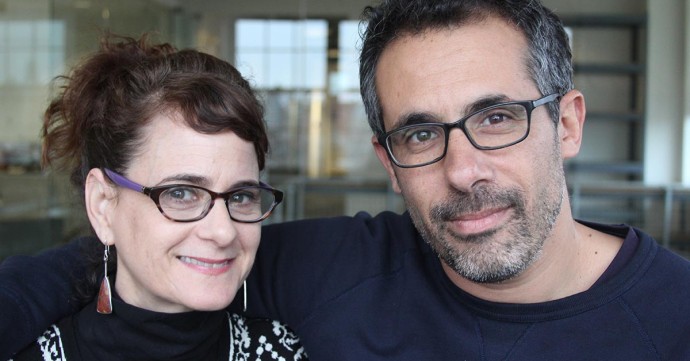
For the month of August, we are thrilled to spotlight a director duo who champion untold stories (like that of the Check It crew) that demand to be told and, in this case, to be seen, bringing all the head-turning looks of DIY high fashion that can be brought! Read our interview with Dana and Toby to find out what motivates this filmmaking duo, how they met the formidable Check It crew, and how this gang’s story can start conversations about marginalized LGBT youth in our communities.
What is it that brought the two of you together to make this documentary film?
We first teamed up for HBO to co-direct and produce a feature-length documentary—The Nine Lives of Marion Barry (2009)—about the infamous former D.C. mayor and politician. As so often happens, one film leads to another. We met Ron Moten, the Check It’s mentor, while making the Barry film. He mentioned that he was working with the Check It and that these were some of the most extraordinary kids that he had ever met. Once we met the crew, there was no turning back.
What is your history with documentary film? Is there a red thread that has followed you in some way throughout your career?
Between us, we’ve separately worked on a wide range of stories and topics for PBS, CNN, BBC, A&E, National Geographic, The History Channel, and The Sundance Channel to name a few. A red thread that you might say follows our work is the desire to tell stories that no one else is telling and what keeps us going is an intense fascination with our characters’ lives and the passionate conviction that their story needs widespread illumination.
Members of The Check It crew have grown up in very difficult circumstances and faced incredible hardships including discrimination, homophobia, violence, homelessness, poverty, and a general lack of support in the most basic sense. Yet they have persevered, coming together to protect one another and also put their creativity to work. What are members of The Check It up to now? For example, have any of the crew members continued to pursue fashion?
We’re thrilled to report that the Check It recently opened their own clothing store. Many of the Check It are now working on developing the fashion line and helping create a community center at their store location. The Check It kids have also been trained as outreach workers and are now counseling kids like themselves who are on the streets. There are many members of the Check It and everyone, of course, has their own story, but overall, there has been a real transformation in the group.
The Check It is a very close knit group and perhaps not very open to outsiders, which would be understandable given their experiences. How did you gain their trust during the filming process? Was it difficult to get them to open up or let you into their lives?
It’s a challenge to gain the trust of kids who have been let down by many people and the institutions that they have encountered in their lives. It took patience but most importantly time. We had to show that we were there for them for the long haul.
The film takes place in close proximity to the nation’s capital and seat of power, while telling a story of perhaps the most marginalized of the marginalized in the U.S.—LGBT African-Americans. How do you hope the telling of this story contributes to changes in the community, the nation at large or its policies? Have you seen any changes so far?
The first step in making change is identifying what needs to be changed. We believe that making this film is helping do that. Locally here in D.C., we’ve seen a radically different attitude that the community has towards the Check It, as well as how the Check It now see themselves. We hope that the film can be used as a platform for discussion around the world, because sadly, there are marginalized LGBT kids everywhere.
After seeing a documentary, many people are eager to take action or apply what they’ve learned to their own life. Is there something specific you would like viewers (including any international audiences) to do or a conversation you would like them to have after watching CHECK IT?
There are marginalized LGBT youths living on the street in dire conditions worldwide because they’ve been rejected by their families, schools, churches, and communities. What can be done to help? How do these kids end up in these situations? What can be done to prevent this from happening? This is a conversation that many communities need to have. People can help the Check It themselves by supporting their fashion line and buying their products at www.checkitenterprises.com. For people who are in D.C. or for travelers visiting the nation’s capital, please go visit the Check It at their store at 1920 Martin Luther King Blvd SE, D.C. Become a mentor! Donate sewing machines or material! Get involved!
What would your documentary playlist consist of?
So many great films out there! Here are some favorites, in no particular order, and centering on no particular theme:
Tempestad, The Act of Killing, Winnebago Man, City of Ghosts, Exit Through the Gift Shop, and Bombay Beach
CHECK IT is Influence Film Club’s featured film for August 2017. Each month Influence Film Club hand-picks one of our favorite docs as our club’s featured film to watch and discuss together. Throughout the month, starting with our newsletter and continuing on our website and social media, we will extend the conversation by exploring the various issues touched on in the film, providing filmmaker interviews, suggesting ways to influence, and discussing documentaries in general—because after all, We Love Docs.
Interview by: Nicole Smith